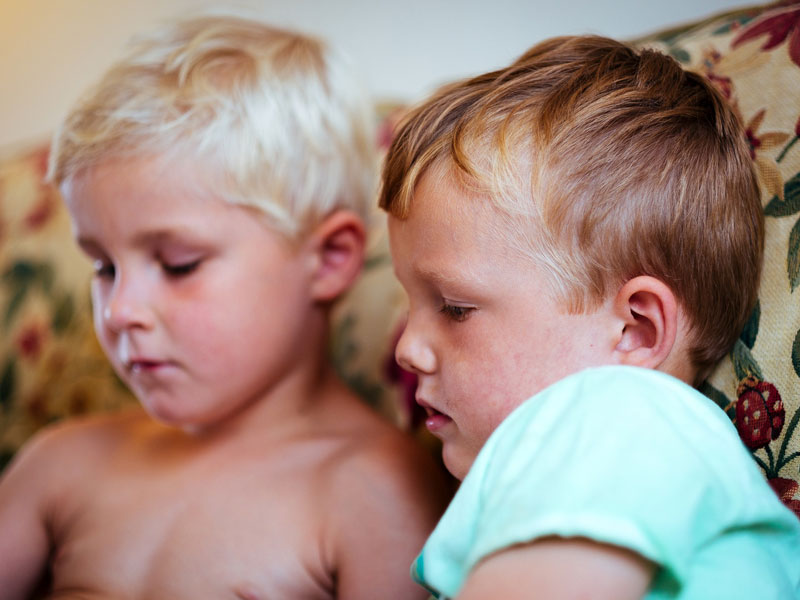Yesterday I was watching two children as they interacted with each other, one was my son, and the other his cousin. For the duration of the week I had been contemplating the reason that so many people find the holidays to be a time of such immense stress, yet look forward to their arrival every year.
 As I watched these children fight over possession of almost everything around them, it occurred to me that they don’t ever stop to think about why they spend so much time and effort trying to “claim” their surroundings for their own. This game of materialistic keep-away was natural to them, it was primal.
As I watched these children fight over possession of almost everything around them, it occurred to me that they don’t ever stop to think about why they spend so much time and effort trying to “claim” their surroundings for their own. This game of materialistic keep-away was natural to them, it was primal.
It made me realize that a lot of our unhappiness and higher levels of perceived stress come from the expectation of life to go a certain way for us. We are constantly reacting to the events that unfold before us, rather than responding to them from a place of mindfulness and love. We, like children, forget to stop to think about how we’re acting and why.
We ask ourselves often why others are doing things that annoy us, but, like these two children, we rarely stop to consider what our own purpose and intent is.
Do You React Or Respond?
In his guest post The Spirit Of Response, Douglas Holwerda defines well the idea that helps us to see “the other” in our daily situations from a place of love and tolerance, and eloquently compares the beautiful nature of response vs react.
“Responses start with the questions, “Who am I? What are my values? What is it I will not compromise? How can I maintain my integrity?
… A response also includes an ability to see the other, maybe the enemy, in ways that humanize them as well. We might ask, “What are they afraid of? What makes them want to take power? How am I, unknowingly, posing a threat to them? What is the intensity of their emotions? What are the positive ideals I can see in them?”
Like a bully in the school yard, or child with a tantrum when we step back to see that they are acting out of intense emotions and a need for power, we can know better how to affect their behavior by responding to their needs.”
 Responding to their needs, isn’t this the basis of all the the graceful action of humanity? The real trick is to not only avoid overreaction to our own unmet needs, but to know how to respond in a way that helps to meet the needs of others as well.
Responding to their needs, isn’t this the basis of all the the graceful action of humanity? The real trick is to not only avoid overreaction to our own unmet needs, but to know how to respond in a way that helps to meet the needs of others as well.
A Day Like Today
I know it’s not only me that finds the way that mainstream media stirs the pot of politics stressful. My Facebook news feed is full of friends who share articles designed to invoke fear and shock into our hearts as a sell-tactic.
Honestly, it’s difficult not to react to these outright lies of journalism. ISIS, the upcoming election, the state of decay of our human rights, it’s all there, spun with a tone that’s designed to get us to do only one thing… To react.
It’s what we have been conditioned to do. To react to our emotions and the emotions of others before we take the time to consider what and where the information is coming from. We are becoming a culture of reactionaries, growing up to become leaders and politicians who act in the very same way.
From sibling conflicts to family politics, all the way up to the geopolitical level of decision making. Pride and preservation of ego are reactionary results that are being drawn into the legislation of our national and global affairs. The effect of reacting rather than responding is felt heavily.
A Solution

In his book, Nonviolent Communication, Marshall Rosenberg addresses many of the deep-rooted issues of our inability to effectively communicate our feelings and needs or deeply listen to those of others. This excerpt says it well…
“Unfortunately, for centuries our culture has taught us to think and speak in ways that can actually perpetuate conflict, internal pain and even violence. Nonviolent Communication partners practical skills with a powerful consciousness and vocabulary to help you get what you want peacefully.”
It can’t be stressed enough that to overcome conflict, the first step is to remain calm. In stillness we come to know ourselves better, as well as the needs of others. We can begin to meet the requirements of both ourselves and that of others in a way that is in alignment with our souls. By striving to be less reactionary when the flow of common action rushes toward emotional overreaction we demonstrate that the way of love includes considered responses.
Support this idea with a ‘Striving To Be Less Reactionary’ small bumper sticker.

the word “reactionary” does not apply to the situation delineated in your interesting observations and article. It refers to a nearly radical conservative person, especially re:politics.
Ahaa, its good discussion concerning this paragraph here at this blog, I have read all that, so at thhis
time me also commenting here.